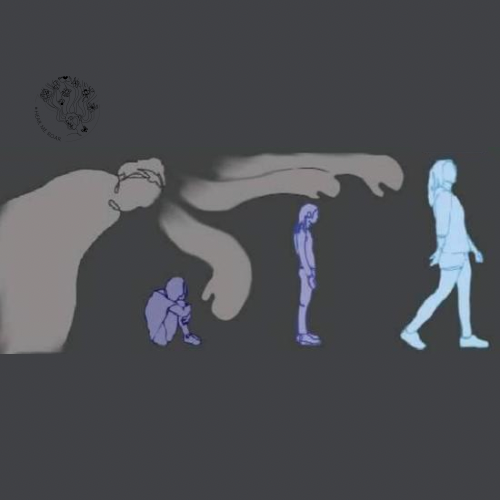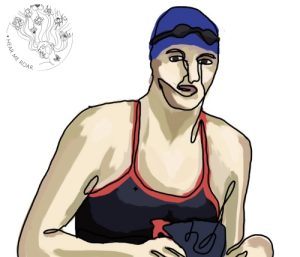Surviving After Assault

After experiencing something as terrifying as sexual assault, it can be difficult to escape from the shadows that an assaulter leaves hanging over their victims. While it’s true that time heals, I’ve found time only made me push down my anxiety until it was smothering me. Taking time is certainly part of the healing journey but seeking help and someone to talk to can do the most help.
October 25, 2021
Warning: this story contains graphic depictions of sexual assault, anxiety, and depression. For help with these issues, contact National Sexual Assault Hotline (800) 656-4673, and National Suicide Prevention Lifeline
(800) 273-8255.
A little girl placed her trust in what she believed was a responsible, adult man. He used that trust to take advantage of her.
That little girl was just one of many, and that little girl was me.
I was only in first or second grade when I went through something that would affect me for the rest of my life: sexual assault.
According to the National Sexual Violence Reasource Center, about 13% of women have experienced sexual coercion in their lifetime and 42.2% were raped before they were 18 years old.
So many women every year are forced or coerced into performing sexual actions they want no part in. So many women are forced to live with those memories every day. And, so many women are strong survivors.
At first, I was not strong.
I pushed the event down in my mind until I had practically forgotten it. But it was always a part of me and constantly pained me, and it took me until years after to realize how much my beliefs were shaped around this one circumstance of sexual assault.
I genuinely feared men – and, rightfully so. Throughout my younger years, men and boys were always betraying my trust and treating me like an object. Thus, I went out of my way to avoid them.
When I started having flashbacks to the event while walking through school hallways or even sitting in the safety of my own bedroom, I knew I had a problem. And I would need to do something to fix it.
I spent almost two years looking into therapy, psychology, and many other mental health related studies to understand what was happening to me. While self-diagnosis isn’t the most reliable, I realized that I was showing signs of depression, social anxiety, post-traumatic stress disorder, and obsessive compulsive disorder.
I couldn’t use public restrooms. I wouldn’t let men walk directly behind me. I had a difficult time looking men in the eyes – even my own father.
After going through the same motions for years and watching my struggles slowly worsen and become habits, I meekly approached my parents in seventh grade to ask them about attending therapy.
My mom had studied psychology in college, and almost went into the field as her major, so she was fairly understanding of why I wanted to see a therapist. Yet, we were never very financially well-off, especially at the time, and both my parents were afraid we couldn’t afford for me to go, so I put it off even longer.
Needless to say, the problem didn’t miraculously get resolved over the next couple years; in fact, it seemed to only get worse.
In my freshman year, my friends were starting to have boyfriends hanging around with us, and I felt pressured to be in a relationship, too. But a part of me just couldn’t completely trust anyone of the male gender.
Things worsened even more when I had a huge disagreement with all of my friends that ended our friendship. I felt more alone than ever.
Like many people my age, my life seemed meaningless to me. I couldn’t form proper relationships with anyone because this instance of sexual assault was affecting my trust of everyone.
I would hurt myself and then hurt others out of anger and fear; I became the worst version of myself.
Yet I went on like this for another year, and simply moved through the motions of my life assuming that pushing down my feelings would make them go away – not just make them worse.
Using school as a distraction, I was surprised with how long I was able to avoid my feelings. But I knew they were still there.
When I took health my sophomore year, I would have little panic attacks when we were going through the sexual assault chapter. Typically, that just meant turning my head down to my desk and holding my hands in my lap while they shook from the flashbacks playing on repeat in my mind.
I just couldn’t stop seeing his face and associating that face with every other man I came across, no matter how nice they were to me.
In my mind, it was my fault. I had done everything wrong. I hadn’t told him to stop. I hadn’t told anyone else about what happened. I was a disgusting, defiled, and dreadful person who didn’t deserve to live.
Still, there was a little voice in my head telling me that there was no way sexual assault could have been my fault, especially at such a young age.
That little voice was what gave me enough hope to finally let a boy into my life. I found myself crushing on a guy, but it still felt like I was refraining from trusting him and fully giving myself up to a new relationship.
I went to talk to my parents again. This time, I came clean about everything that happened to me.
They supported me and let me know of their remorse for what I went through, and they agreed that I should attend therapy even if it could be costly. My life was worth more than money.
So, at the end of my sophomore year, I started attending therapy. I wish I could say that it was all downhill from there, but it wasn’t.
For most people who attend therapy, that means problem solving through issues. Since I had never been to therapy before, I didn’t know what to expect – I thought I would just be telling some old lady about how terrible the world was while she nodded along and offered me crumpets.
In fact, the first therapist I came across was an older lady, but I couldn’t make my busy schedule work with hers. Thus, the search continued.
I originally didn’t want a male therapist because of my sexual assault induced anxiety. However, the next therapist I stumbled upon was a man and had lots of experience with the issues similar to mine.
It wasn’t easy to tell some stranger all my deepest secrets, and it took me a while and a lot of anxiety to come clean. Even now, he doesn’t know everything about me. And that’s OK; I learned that you don’t have to tell everyone everything about yourself in order to trust them.
So, my long journey to recovery had finally started to see the crest of the mountain.
For the beginning of my therapy, everything seemed worse than before: he was making me feel all the emotions I had suppressed over the years. But by bringing those feelings into the front, center stage of my mind, I was able to address and eventually tackle them.
After pages of worksheets and hours of exposure and discussion I realized that the sexual assault had never been my fault. When you’re assaulted, it is never your fault.
I started to love myself which in turn helped me love and trust others. My cautious instincts around men will never fully go away, but I can live with that because they are part of me and remind me that I am a survivor.
Here I am now, almost a senior in high school, and, believe me, it’s been a fight. And as high school comes to a close, I will take the sexual assault with me and never forget because I know that I am not to blame, and I know that it made me into the strong woman I am today.
This article is a part of Seckman’s “Hear Me Roar” column, which won First Place Column from CSMA.
This story was a finalist for Best Opinion for NSPA.





















